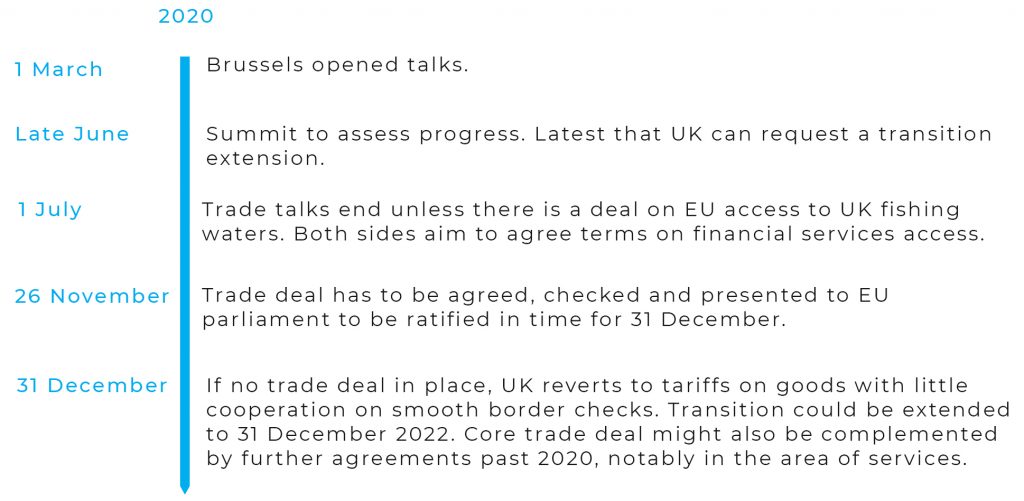Brexit brinkmanship?
The UK is slowly emerging from lockdown, however, while the relentless focus has been on survival, businesses face still more uncertainty due to Brexit.
Crucial trade talks with the EU27 have restarted, against a resolute decision by Boris Johnson not to seek an extension to the present transition period, which ends on 31 December 2020. Once we pass 30 June, that possibility (however slim) is completely extinguished.
Drawing on the 2019 Political Declaration that was part of the Withdrawal Treaty, the EU is likely to push hard for a ‘level playing field’, where the UK stays in line with EU environmental and labour market rules. Access to the EU’s market will come with tough conditions attached. This is both in terms of the UK’s continued adherence to the bloc’s rules and its acceptance of a role for the European Court of Justice (ECJ).
The UK position continues to drive hard for a free trade deal on tariffs and quotas – but the concessions for this to happen may well be too big for Boris Johnson to accept. Regarding the ECJ, Brussels insists that the ECJ must have a role in settling any disputes in the future over how to interpret EU law. Boris Johnson signed up to this in the Political Declaration.
Unless agreement is reached in the next six months, come 1 January 2021, we are firmly in no-deal territory. Remember Operation Yellowhammer? That was the government’s contingency plan to prepare for leaving the EU without a deal. A series of ‘reasonable worst-case planning assumptions’ covered transport, food, healthcare, energy, the Irish border and public order. Well, Operation Yellowhammer will restart and, as we near Christmas, a repeat of last year’s winter newspaper headlines and pictures is a distinct possibility.
No deal means tariffs – and the cost of goods increasing – whether it’s on cars, beef or milk, to name but a few.
Businesses simply cannot afford a double hit of Coronavirus lockdown and no-deal Brexit. With almost 50% of UK trade involving the EU27, the need to preserve jobs and stimulate growth is now more important than ever – across both markets.
However, notwithstanding all the Brexit uncertainties stretching back to the June 2016 referendum, let’s not forget that nothing has actually yet changed. The French saying ‘plus ça change, plus c’est la même chose’, while apposite now, will almost certainly not be the phrase of choice come 1 January 2021.
To mitigate potential uncertainty, upheaval and extra cost of a no-deal Brexit, Moore Kingston Smith can help with contingency planning and guidance. Our BX360 analysis tool provides a bespoke evaluation of how Brexit will affect individual businesses. Find out more about BX360 here.


